Unit 2 Great minds> 专项练习(含答案)2025-2026学年沪教牛津版(广州深圳沈阳通用)九年级英语上册
文档属性
| 名称 | Unit 2 Great minds> 专项练习(含答案)2025-2026学年沪教牛津版(广州深圳沈阳通用)九年级英语上册 | 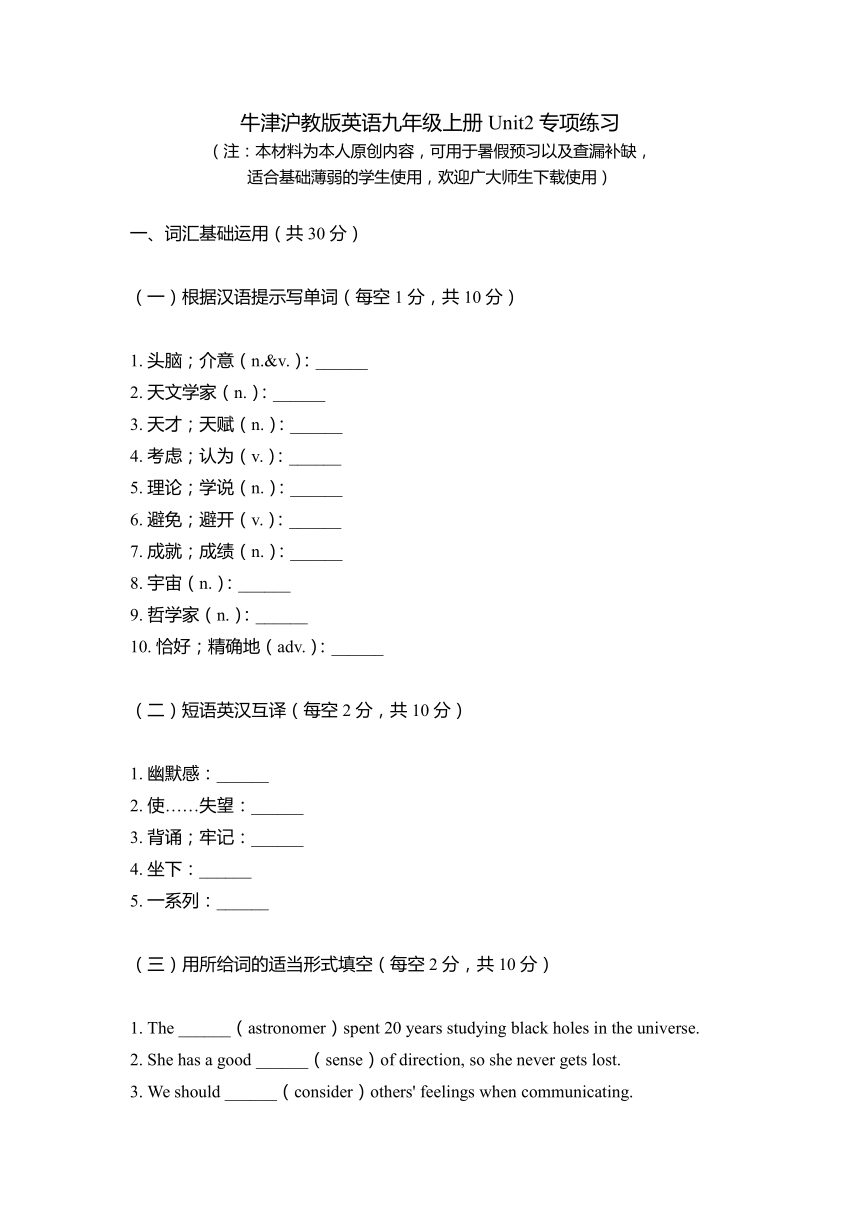 | |
| 格式 | docx | ||
| 文件大小 | 23.5KB | ||
| 资源类型 | 教案 | ||
| 版本资源 | 牛津深圳版 | ||
| 科目 | 英语 | ||
| 更新时间 | 2025-07-10 14:27:55 | ||
图片预览

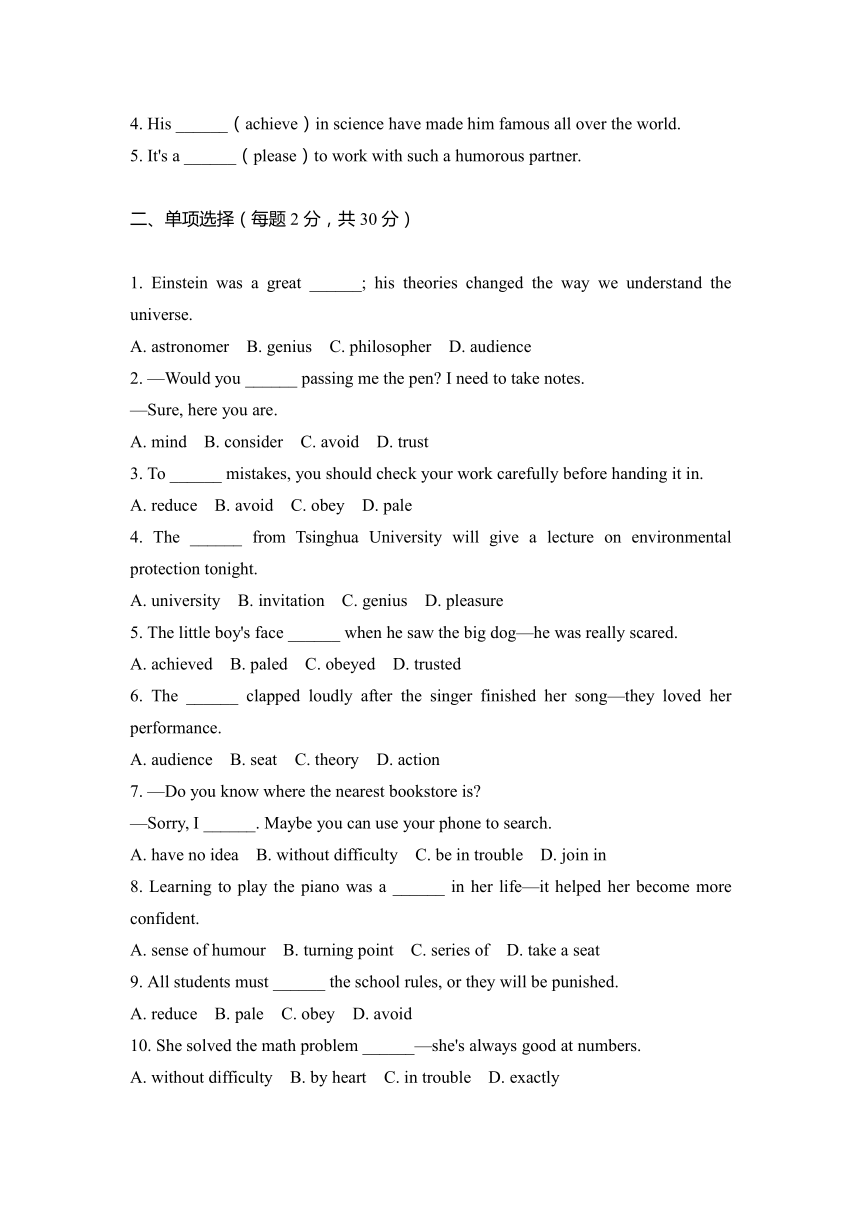
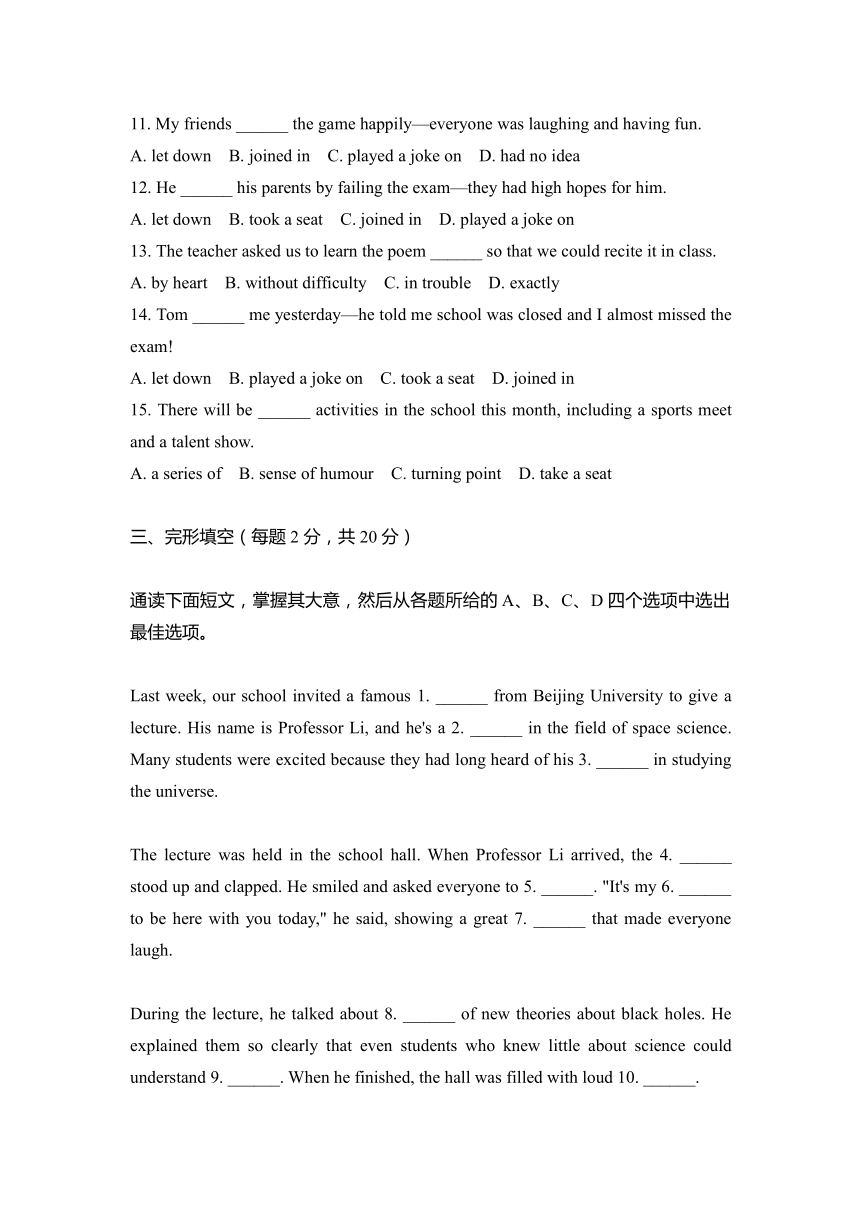
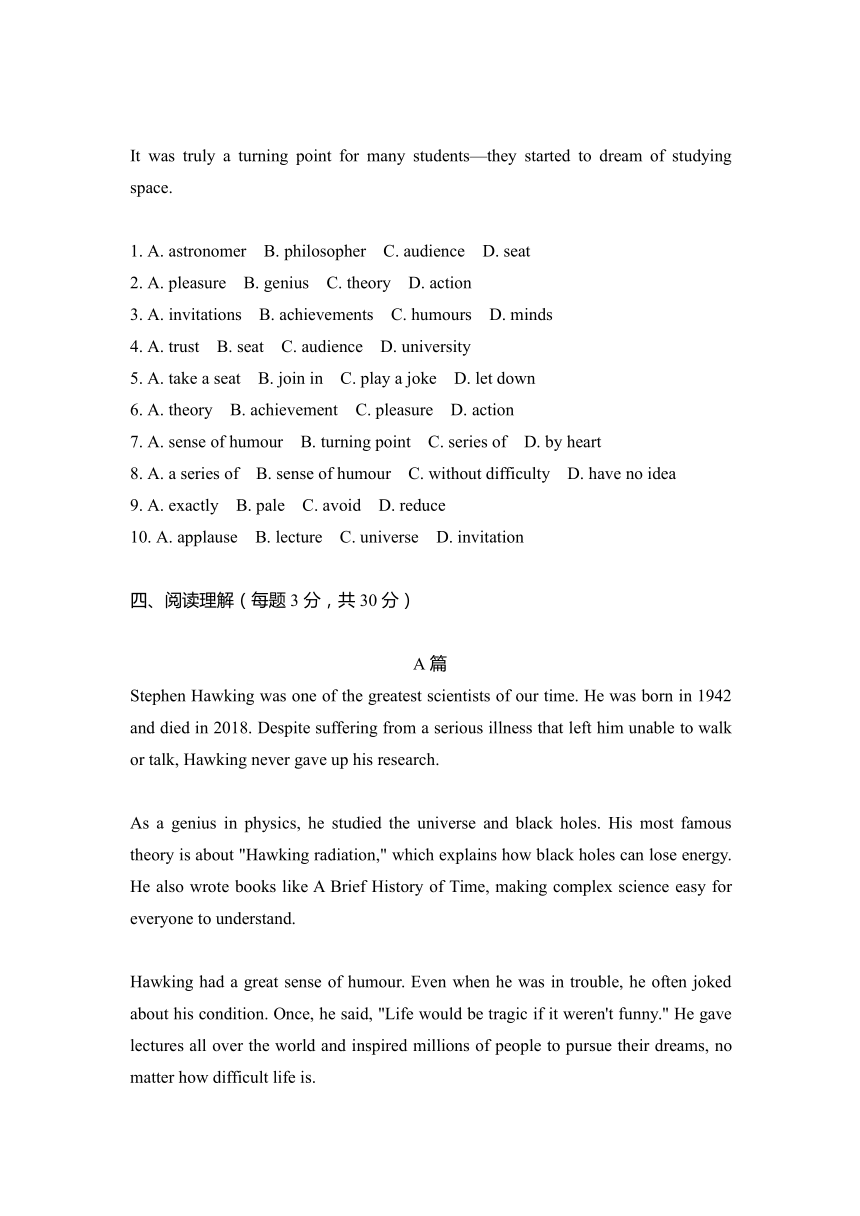
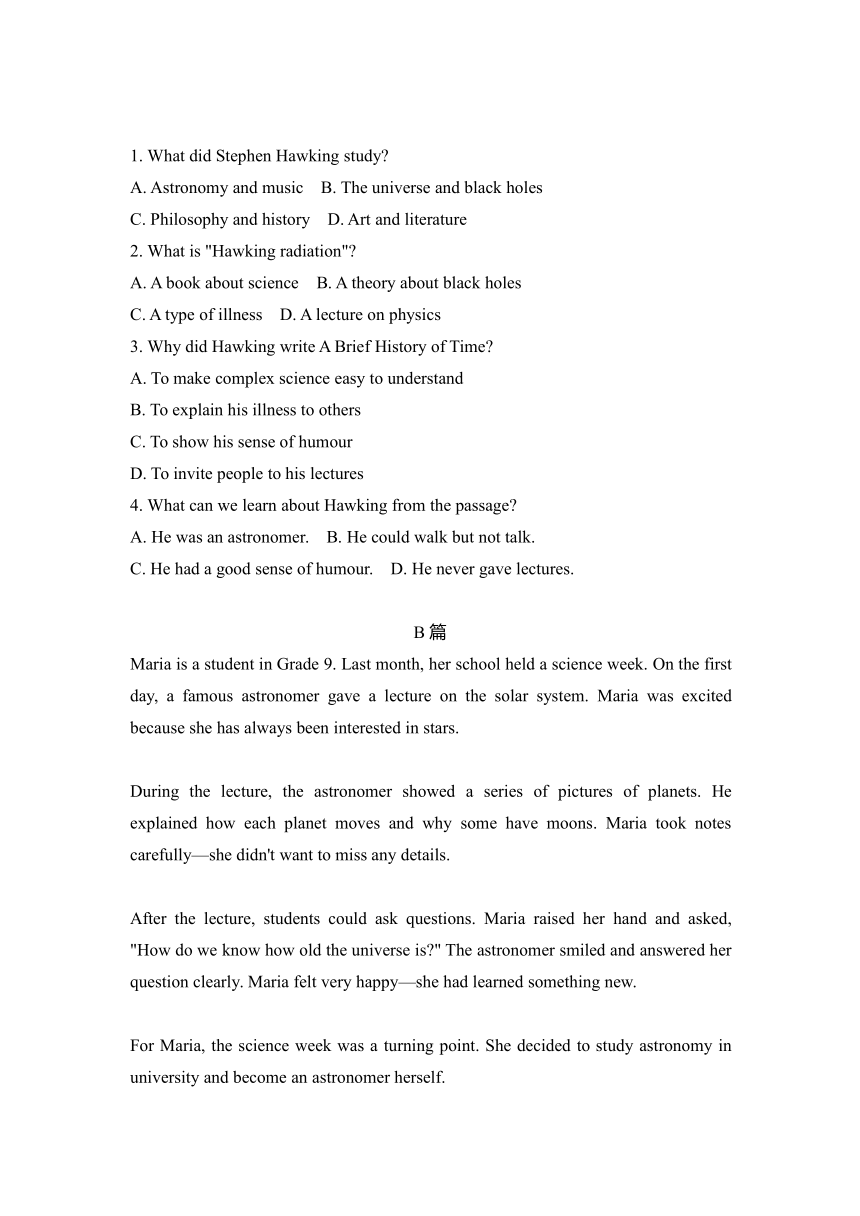
文档简介
牛津沪教版英语九年级上册Unit2专项练习
(注:本材料为本人原创内容,可用于暑假预习以及查漏补缺,
适合基础薄弱的学生使用,欢迎广大师生下载使用)
一、词汇基础运用(共30分)
(一)根据汉语提示写单词(每空1分,共10分)
1. 头脑;介意(n.&v.):______
2. 天文学家(n.):______
3. 天才;天赋(n.):______
4. 考虑;认为(v.):______
5. 理论;学说(n.):______
6. 避免;避开(v.):______
7. 成就;成绩(n.):______
8. 宇宙(n.):______
9. 哲学家(n.):______
10. 恰好;精确地(adv.):______
(二)短语英汉互译(每空2分,共10分)
1. 幽默感:______
2. 使……失望:______
3. 背诵;牢记:______
4. 坐下:______
5. 一系列:______
(三)用所给词的适当形式填空(每空2分,共10分)
1. The ______(astronomer)spent 20 years studying black holes in the universe.
2. She has a good ______(sense)of direction, so she never gets lost.
3. We should ______(consider)others' feelings when communicating.
4. His ______(achieve)in science have made him famous all over the world.
5. It's a ______(please)to work with such a humorous partner.
二、单项选择(每题2分,共30分)
1. Einstein was a great ______; his theories changed the way we understand the universe.
A. astronomer B. genius C. philosopher D. audience
2. —Would you ______ passing me the pen I need to take notes.
—Sure, here you are.
A. mind B. consider C. avoid D. trust
3. To ______ mistakes, you should check your work carefully before handing it in.
A. reduce B. avoid C. obey D. pale
4. The ______ from Tsinghua University will give a lecture on environmental protection tonight.
A. university B. invitation C. genius D. pleasure
5. The little boy's face ______ when he saw the big dog—he was really scared.
A. achieved B. paled C. obeyed D. trusted
6. The ______ clapped loudly after the singer finished her song—they loved her performance.
A. audience B. seat C. theory D. action
7. —Do you know where the nearest bookstore is
—Sorry, I ______. Maybe you can use your phone to search.
A. have no idea B. without difficulty C. be in trouble D. join in
8. Learning to play the piano was a ______ in her life—it helped her become more confident.
A. sense of humour B. turning point C. series of D. take a seat
9. All students must ______ the school rules, or they will be punished.
A. reduce B. pale C. obey D. avoid
10. She solved the math problem ______—she's always good at numbers.
A. without difficulty B. by heart C. in trouble D. exactly
11. My friends ______ the game happily—everyone was laughing and having fun.
A. let down B. joined in C. played a joke on D. had no idea
12. He ______ his parents by failing the exam—they had high hopes for him.
A. let down B. took a seat C. joined in D. played a joke on
13. The teacher asked us to learn the poem ______ so that we could recite it in class.
A. by heart B. without difficulty C. in trouble D. exactly
14. Tom ______ me yesterday—he told me school was closed and I almost missed the exam!
A. let down B. played a joke on C. took a seat D. joined in
15. There will be ______ activities in the school this month, including a sports meet and a talent show.
A. a series of B. sense of humour C. turning point D. take a seat
三、完形填空(每题2分,共20分)
通读下面短文,掌握其大意,然后从各题所给的A、B、C、D四个选项中选出最佳选项。
Last week, our school invited a famous 1. ______ from Beijing University to give a lecture. His name is Professor Li, and he's a 2. ______ in the field of space science. Many students were excited because they had long heard of his 3. ______ in studying the universe.
The lecture was held in the school hall. When Professor Li arrived, the 4. ______ stood up and clapped. He smiled and asked everyone to 5. ______. "It's my 6. ______ to be here with you today," he said, showing a great 7. ______ that made everyone laugh.
During the lecture, he talked about 8. ______ of new theories about black holes. He explained them so clearly that even students who knew little about science could understand 9. ______. When he finished, the hall was filled with loud 10. ______.
It was truly a turning point for many students—they started to dream of studying space.
1. A. astronomer B. philosopher C. audience D. seat
2. A. pleasure B. genius C. theory D. action
3. A. invitations B. achievements C. humours D. minds
4. A. trust B. seat C. audience D. university
5. A. take a seat B. join in C. play a joke D. let down
6. A. theory B. achievement C. pleasure D. action
7. A. sense of humour B. turning point C. series of D. by heart
8. A. a series of B. sense of humour C. without difficulty D. have no idea
9. A. exactly B. pale C. avoid D. reduce
10. A. applause B. lecture C. universe D. invitation
四、阅读理解(每题3分,共30分)
A篇
Stephen Hawking was one of the greatest scientists of our time. He was born in 1942 and died in 2018. Despite suffering from a serious illness that left him unable to walk or talk, Hawking never gave up his research.
As a genius in physics, he studied the universe and black holes. His most famous theory is about "Hawking radiation," which explains how black holes can lose energy. He also wrote books like A Brief History of Time, making complex science easy for everyone to understand.
Hawking had a great sense of humour. Even when he was in trouble, he often joked about his condition. Once, he said, "Life would be tragic if it weren't funny." He gave lectures all over the world and inspired millions of people to pursue their dreams, no matter how difficult life is.
1. What did Stephen Hawking study
A. Astronomy and music B. The universe and black holes
C. Philosophy and history D. Art and literature
2. What is "Hawking radiation"
A. A book about science B. A theory about black holes
C. A type of illness D. A lecture on physics
3. Why did Hawking write A Brief History of Time
A. To make complex science easy to understand
B. To explain his illness to others
C. To show his sense of humour
D. To invite people to his lectures
4. What can we learn about Hawking from the passage
A. He was an astronomer. B. He could walk but not talk.
C. He had a good sense of humour. D. He never gave lectures.
B篇
Maria is a student in Grade 9. Last month, her school held a science week. On the first day, a famous astronomer gave a lecture on the solar system. Maria was excited because she has always been interested in stars.
During the lecture, the astronomer showed a series of pictures of planets. He explained how each planet moves and why some have moons. Maria took notes carefully—she didn't want to miss any details.
After the lecture, students could ask questions. Maria raised her hand and asked, "How do we know how old the universe is " The astronomer smiled and answered her question clearly. Maria felt very happy—she had learned something new.
For Maria, the science week was a turning point. She decided to study astronomy in university and become an astronomer herself.
5. What did the astronomer talk about in the lecture
A. Black holes B. The solar system
C. Hawking's theories D. Environmental protection
6. What did the astronomer show during the lecture
A. A series of pictures of planets B. A book about the universe
C. A model of the Earth D. A video of stars
7. What question did Maria ask
A. How many planets are there B. Why do stars shine
C. How old is the universe D. What is a black hole
8. What did Maria decide to do after the science week
A. Write a book about science B. Study astronomy in university
C. Give lectures on the solar system D. Learn physics by heart
C篇
It's important to have good communication skills. Here are some tips:
A. Listen carefully. When someone is talking, focus on their words. Don't interrupt—wait until they finish. This shows you trust and respect them.
B. Consider others' feelings. Think about how your words might make others feel. Avoid saying things that could hurt them.
C. Be clear. Speak exactly what you mean. This helps avoid misunderstandings.
D. Have a sense of humour. A little joke can make conversations more friendly, but don't play a joke on someone if they might get upset.
E. Join in discussions. Share your ideas, but also listen to others. This helps build good relationships.
9. What is the first tip for good communication
A. Be clear B. Listen carefully C. Have a sense of humour D. Join in discussions
10. Why should we consider others' feelings
A. To avoid hurting them B. To make jokes C. To interrupt others D. To show off
答案及解析
一、词汇基础运用
(一)1. mind 解析:基础词汇,兼具名词和动词词性。
2. astronomer 解析:研究宇宙天体的学者,由astronomy变形而来。
3. genius 解析:指“天才人物”或“天赋”,符合中考基础词汇要求。
4. consider 解析:常用搭配consider doing sth.,意为“考虑做某事”。
5. theory 解析:与“实践”相对,如科学理论。
6. avoid 解析:后接动名词,意为“避免”。
7. achievement 解析:指“成就”,由achieve变形而来。
8. universe 解析:独一无二的“宇宙”,前常加the。
9. philosopher 解析:研究哲学的学者。
10. exactly 解析:副词,强调“精确性”。
(二)1. sense of humour 解析:固定短语,指“幽默感”。
2. let...down 解析:动词短语,意为“使……失望”。
3. by heart 解析:指“背诵;牢记”,如learn by heart。
4. take a seat 解析:礼貌表达“坐下”,相当于sit down。
5. a series of 解析:后接可数名词复数,指“一系列”。
(三)1. astronomer 解析:由句意“研究黑洞”可知是天文学家,用名词形式。
2. sense 解析:a sense of direction意为“方向感”,用名词形式。
3. consider 解析:情态动词should后接动词原形,意为“考虑”。
4. achievements 解析:由“his”和“have”可知用名词复数,指“成就”。
5. pleasure 解析:It's a pleasure to do sth. 意为“做某事很愉快”,用名词形式。
二、单项选择
1. B 解析:爱因斯坦是“天才(genius)”,其理论改变了对宇宙的认知;astronomer(天文学家)、philosopher(哲学家)、audience(观众)均不符合。
2. A 解析:Would you mind doing sth. 是固定句型,意为“你介意做某事吗?”,符合语境。
3. B 解析:句意“为避免错误,应仔细检查”,avoid(避免)符合;reduce(减少)、obey(服从)、pale(苍白)不符。
4. C 解析:能做讲座的应是“天才/学者(genius)”;university(大学)、invitation(邀请)、pleasure(乐趣)不符。
5. B 解析:看到大狗时“脸色苍白(pale)”,符合“害怕”的语境。
6. A 解析:歌手表演后“观众(audience)”鼓掌,符合逻辑。
7. A 解析:由“Sorry”可知“不知道(have no idea)”,其他选项搭配不当。
8. B 解析:“学钢琴是人生转折点(turning point)”,符合“变得自信”的语境。
9. C 解析:“遵守(obey)校规”是固定搭配,其他选项不符。
10. A 解析:“轻松地(without difficulty)解决问题”,符合“擅长数学”的语境。
11. B 解析:“积极加入(joined in)游戏”,符合“开心玩闹”的场景。
12. A 解析:“考试失败让父母失望(let down)”,符合“父母寄予厚望”的语境。
13. A 解析:“背诵(by heart)诗歌”,符合“课堂背诵”的要求。
14. B 解析:“开玩笑(played a joke on)”符合“藏书包”的行为。
15. A 解析:“一系列(a series of)活动”,后接可数名词复数,符合语境。
三、完形填空
1. A 解析:由“研究宇宙”可知是“天文学家(astronomer)”。
2. B 解析:“天才(genius)”符合“在太空科学领域有成就”的语境。
3. B 解析:“成就(achievements)”与“研究宇宙”搭配合理。
4. C 解析:“观众(audience)”起立鼓掌,符合讲座场景。
5. A 解析:“坐下(take a seat)”是礼貌回应,符合语境。
6. C 解析:It's a pleasure to... 意为“很荣幸……”,固定表达。
7. A 解析:“幽默感(sense of humour)”使大家笑,符合语境。
8. A 解析:“一系列(a series of)理论”,搭配合理。
9. A 解析:“精确地(exactly)理解”,强调清晰性。
10. A 解析:讲座结束后“掌声(applause)”响起,符合场景。
四、阅读理解
1. B 解析:由第二段“he studied the universe and black holes”可知。
2. B 解析:由第二段“His most famous theory is about 'Hawking radiation,' which explains how black holes can lose energy”可知。
3. A 解析:由第二段“making complex science easy for everyone to understand”可知。
4. C 解析:由第三段“Hawking had a great sense of humour”可知。
5. B 解析:由第二段“a famous astronomer gave a lecture on the solar system”可知。
6. A 解析:由第二段“the astronomer showed a series of pictures of planets”可知。
7. C 解析:由第三段“Maria raised her hand and asked, 'How do we know how old the universe is '”可知。
8. B 解析:由最后一段“She decided to study astronomy in university”可知。
9. B 解析:由第一条建议“Listen carefully”可知。
10. A 解析:由第二条建议“Avoid saying things that could hurt them”可知。
(注:本材料为本人原创内容,可用于暑假预习以及查漏补缺,
适合基础薄弱的学生使用,欢迎广大师生下载使用)
一、词汇基础运用(共30分)
(一)根据汉语提示写单词(每空1分,共10分)
1. 头脑;介意(n.&v.):______
2. 天文学家(n.):______
3. 天才;天赋(n.):______
4. 考虑;认为(v.):______
5. 理论;学说(n.):______
6. 避免;避开(v.):______
7. 成就;成绩(n.):______
8. 宇宙(n.):______
9. 哲学家(n.):______
10. 恰好;精确地(adv.):______
(二)短语英汉互译(每空2分,共10分)
1. 幽默感:______
2. 使……失望:______
3. 背诵;牢记:______
4. 坐下:______
5. 一系列:______
(三)用所给词的适当形式填空(每空2分,共10分)
1. The ______(astronomer)spent 20 years studying black holes in the universe.
2. She has a good ______(sense)of direction, so she never gets lost.
3. We should ______(consider)others' feelings when communicating.
4. His ______(achieve)in science have made him famous all over the world.
5. It's a ______(please)to work with such a humorous partner.
二、单项选择(每题2分,共30分)
1. Einstein was a great ______; his theories changed the way we understand the universe.
A. astronomer B. genius C. philosopher D. audience
2. —Would you ______ passing me the pen I need to take notes.
—Sure, here you are.
A. mind B. consider C. avoid D. trust
3. To ______ mistakes, you should check your work carefully before handing it in.
A. reduce B. avoid C. obey D. pale
4. The ______ from Tsinghua University will give a lecture on environmental protection tonight.
A. university B. invitation C. genius D. pleasure
5. The little boy's face ______ when he saw the big dog—he was really scared.
A. achieved B. paled C. obeyed D. trusted
6. The ______ clapped loudly after the singer finished her song—they loved her performance.
A. audience B. seat C. theory D. action
7. —Do you know where the nearest bookstore is
—Sorry, I ______. Maybe you can use your phone to search.
A. have no idea B. without difficulty C. be in trouble D. join in
8. Learning to play the piano was a ______ in her life—it helped her become more confident.
A. sense of humour B. turning point C. series of D. take a seat
9. All students must ______ the school rules, or they will be punished.
A. reduce B. pale C. obey D. avoid
10. She solved the math problem ______—she's always good at numbers.
A. without difficulty B. by heart C. in trouble D. exactly
11. My friends ______ the game happily—everyone was laughing and having fun.
A. let down B. joined in C. played a joke on D. had no idea
12. He ______ his parents by failing the exam—they had high hopes for him.
A. let down B. took a seat C. joined in D. played a joke on
13. The teacher asked us to learn the poem ______ so that we could recite it in class.
A. by heart B. without difficulty C. in trouble D. exactly
14. Tom ______ me yesterday—he told me school was closed and I almost missed the exam!
A. let down B. played a joke on C. took a seat D. joined in
15. There will be ______ activities in the school this month, including a sports meet and a talent show.
A. a series of B. sense of humour C. turning point D. take a seat
三、完形填空(每题2分,共20分)
通读下面短文,掌握其大意,然后从各题所给的A、B、C、D四个选项中选出最佳选项。
Last week, our school invited a famous 1. ______ from Beijing University to give a lecture. His name is Professor Li, and he's a 2. ______ in the field of space science. Many students were excited because they had long heard of his 3. ______ in studying the universe.
The lecture was held in the school hall. When Professor Li arrived, the 4. ______ stood up and clapped. He smiled and asked everyone to 5. ______. "It's my 6. ______ to be here with you today," he said, showing a great 7. ______ that made everyone laugh.
During the lecture, he talked about 8. ______ of new theories about black holes. He explained them so clearly that even students who knew little about science could understand 9. ______. When he finished, the hall was filled with loud 10. ______.
It was truly a turning point for many students—they started to dream of studying space.
1. A. astronomer B. philosopher C. audience D. seat
2. A. pleasure B. genius C. theory D. action
3. A. invitations B. achievements C. humours D. minds
4. A. trust B. seat C. audience D. university
5. A. take a seat B. join in C. play a joke D. let down
6. A. theory B. achievement C. pleasure D. action
7. A. sense of humour B. turning point C. series of D. by heart
8. A. a series of B. sense of humour C. without difficulty D. have no idea
9. A. exactly B. pale C. avoid D. reduce
10. A. applause B. lecture C. universe D. invitation
四、阅读理解(每题3分,共30分)
A篇
Stephen Hawking was one of the greatest scientists of our time. He was born in 1942 and died in 2018. Despite suffering from a serious illness that left him unable to walk or talk, Hawking never gave up his research.
As a genius in physics, he studied the universe and black holes. His most famous theory is about "Hawking radiation," which explains how black holes can lose energy. He also wrote books like A Brief History of Time, making complex science easy for everyone to understand.
Hawking had a great sense of humour. Even when he was in trouble, he often joked about his condition. Once, he said, "Life would be tragic if it weren't funny." He gave lectures all over the world and inspired millions of people to pursue their dreams, no matter how difficult life is.
1. What did Stephen Hawking study
A. Astronomy and music B. The universe and black holes
C. Philosophy and history D. Art and literature
2. What is "Hawking radiation"
A. A book about science B. A theory about black holes
C. A type of illness D. A lecture on physics
3. Why did Hawking write A Brief History of Time
A. To make complex science easy to understand
B. To explain his illness to others
C. To show his sense of humour
D. To invite people to his lectures
4. What can we learn about Hawking from the passage
A. He was an astronomer. B. He could walk but not talk.
C. He had a good sense of humour. D. He never gave lectures.
B篇
Maria is a student in Grade 9. Last month, her school held a science week. On the first day, a famous astronomer gave a lecture on the solar system. Maria was excited because she has always been interested in stars.
During the lecture, the astronomer showed a series of pictures of planets. He explained how each planet moves and why some have moons. Maria took notes carefully—she didn't want to miss any details.
After the lecture, students could ask questions. Maria raised her hand and asked, "How do we know how old the universe is " The astronomer smiled and answered her question clearly. Maria felt very happy—she had learned something new.
For Maria, the science week was a turning point. She decided to study astronomy in university and become an astronomer herself.
5. What did the astronomer talk about in the lecture
A. Black holes B. The solar system
C. Hawking's theories D. Environmental protection
6. What did the astronomer show during the lecture
A. A series of pictures of planets B. A book about the universe
C. A model of the Earth D. A video of stars
7. What question did Maria ask
A. How many planets are there B. Why do stars shine
C. How old is the universe D. What is a black hole
8. What did Maria decide to do after the science week
A. Write a book about science B. Study astronomy in university
C. Give lectures on the solar system D. Learn physics by heart
C篇
It's important to have good communication skills. Here are some tips:
A. Listen carefully. When someone is talking, focus on their words. Don't interrupt—wait until they finish. This shows you trust and respect them.
B. Consider others' feelings. Think about how your words might make others feel. Avoid saying things that could hurt them.
C. Be clear. Speak exactly what you mean. This helps avoid misunderstandings.
D. Have a sense of humour. A little joke can make conversations more friendly, but don't play a joke on someone if they might get upset.
E. Join in discussions. Share your ideas, but also listen to others. This helps build good relationships.
9. What is the first tip for good communication
A. Be clear B. Listen carefully C. Have a sense of humour D. Join in discussions
10. Why should we consider others' feelings
A. To avoid hurting them B. To make jokes C. To interrupt others D. To show off
答案及解析
一、词汇基础运用
(一)1. mind 解析:基础词汇,兼具名词和动词词性。
2. astronomer 解析:研究宇宙天体的学者,由astronomy变形而来。
3. genius 解析:指“天才人物”或“天赋”,符合中考基础词汇要求。
4. consider 解析:常用搭配consider doing sth.,意为“考虑做某事”。
5. theory 解析:与“实践”相对,如科学理论。
6. avoid 解析:后接动名词,意为“避免”。
7. achievement 解析:指“成就”,由achieve变形而来。
8. universe 解析:独一无二的“宇宙”,前常加the。
9. philosopher 解析:研究哲学的学者。
10. exactly 解析:副词,强调“精确性”。
(二)1. sense of humour 解析:固定短语,指“幽默感”。
2. let...down 解析:动词短语,意为“使……失望”。
3. by heart 解析:指“背诵;牢记”,如learn by heart。
4. take a seat 解析:礼貌表达“坐下”,相当于sit down。
5. a series of 解析:后接可数名词复数,指“一系列”。
(三)1. astronomer 解析:由句意“研究黑洞”可知是天文学家,用名词形式。
2. sense 解析:a sense of direction意为“方向感”,用名词形式。
3. consider 解析:情态动词should后接动词原形,意为“考虑”。
4. achievements 解析:由“his”和“have”可知用名词复数,指“成就”。
5. pleasure 解析:It's a pleasure to do sth. 意为“做某事很愉快”,用名词形式。
二、单项选择
1. B 解析:爱因斯坦是“天才(genius)”,其理论改变了对宇宙的认知;astronomer(天文学家)、philosopher(哲学家)、audience(观众)均不符合。
2. A 解析:Would you mind doing sth. 是固定句型,意为“你介意做某事吗?”,符合语境。
3. B 解析:句意“为避免错误,应仔细检查”,avoid(避免)符合;reduce(减少)、obey(服从)、pale(苍白)不符。
4. C 解析:能做讲座的应是“天才/学者(genius)”;university(大学)、invitation(邀请)、pleasure(乐趣)不符。
5. B 解析:看到大狗时“脸色苍白(pale)”,符合“害怕”的语境。
6. A 解析:歌手表演后“观众(audience)”鼓掌,符合逻辑。
7. A 解析:由“Sorry”可知“不知道(have no idea)”,其他选项搭配不当。
8. B 解析:“学钢琴是人生转折点(turning point)”,符合“变得自信”的语境。
9. C 解析:“遵守(obey)校规”是固定搭配,其他选项不符。
10. A 解析:“轻松地(without difficulty)解决问题”,符合“擅长数学”的语境。
11. B 解析:“积极加入(joined in)游戏”,符合“开心玩闹”的场景。
12. A 解析:“考试失败让父母失望(let down)”,符合“父母寄予厚望”的语境。
13. A 解析:“背诵(by heart)诗歌”,符合“课堂背诵”的要求。
14. B 解析:“开玩笑(played a joke on)”符合“藏书包”的行为。
15. A 解析:“一系列(a series of)活动”,后接可数名词复数,符合语境。
三、完形填空
1. A 解析:由“研究宇宙”可知是“天文学家(astronomer)”。
2. B 解析:“天才(genius)”符合“在太空科学领域有成就”的语境。
3. B 解析:“成就(achievements)”与“研究宇宙”搭配合理。
4. C 解析:“观众(audience)”起立鼓掌,符合讲座场景。
5. A 解析:“坐下(take a seat)”是礼貌回应,符合语境。
6. C 解析:It's a pleasure to... 意为“很荣幸……”,固定表达。
7. A 解析:“幽默感(sense of humour)”使大家笑,符合语境。
8. A 解析:“一系列(a series of)理论”,搭配合理。
9. A 解析:“精确地(exactly)理解”,强调清晰性。
10. A 解析:讲座结束后“掌声(applause)”响起,符合场景。
四、阅读理解
1. B 解析:由第二段“he studied the universe and black holes”可知。
2. B 解析:由第二段“His most famous theory is about 'Hawking radiation,' which explains how black holes can lose energy”可知。
3. A 解析:由第二段“making complex science easy for everyone to understand”可知。
4. C 解析:由第三段“Hawking had a great sense of humour”可知。
5. B 解析:由第二段“a famous astronomer gave a lecture on the solar system”可知。
6. A 解析:由第二段“the astronomer showed a series of pictures of planets”可知。
7. C 解析:由第三段“Maria raised her hand and asked, 'How do we know how old the universe is '”可知。
8. B 解析:由最后一段“She decided to study astronomy in university”可知。
9. B 解析:由第一条建议“Listen carefully”可知。
10. A 解析:由第二条建议“Avoid saying things that could hurt them”可知。
